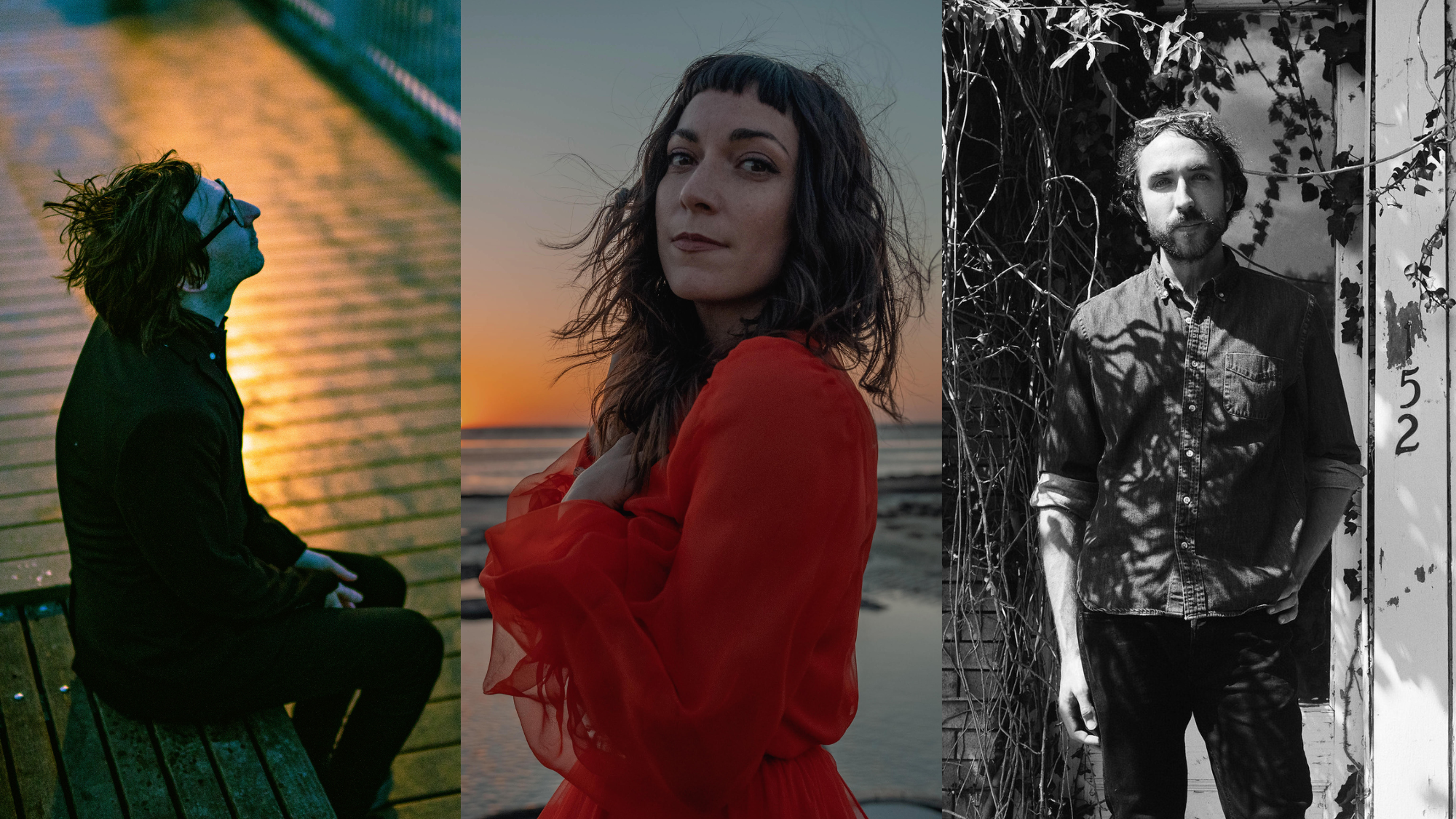
- This event has passed.
Mutual Benefit + Henry Toland + Julie Odell, $15/$18
February 3 @ 3:00 pm

Join us on Saturday, February 3 for a matinee show with Mutual Benefit + Henry Toland + Julie Odell. 3pm show, doors at 2pm.
Tickets: $15 advance, $18 at the door.
MUTUAL BENEFIT:
Mutual Benefit is the chamber folk project of Brooklyn songwriter Jordan Lee. For more than a decade, he has crafted pop experiments that are uniquely comforting but willing to stare down life’s more difficult existential quandaries. His lush songwriting is often pieced together over several years, inspired by the hellos and goodbyes and blurred landscapes of life in flux. As a writer for The New Yorker heard it, “Bells and flutes and strings blend with basic rock instruments; vocal arrangements pulse and flow, and the result shimmies beyond the fence of the familiar.”
HENRY TOLAND:
Songwriter, carpenter, wanderer – Henry Toland wears many hats, and from each pulls seeds for his songs. His melodies, awash in vivid imagery, take you on a personal journey to places of great beauty, sorrow, and joy.
“Woven by the interplay of a light, limber voice and rich guitar, his modern indie-folk sound isn’t afraid of space and understands that a room can be filled with atmosphere instead of volume or busy filigree.” – Orlando Weekly
JULIE ODELL:
Odell describes pursuing music as a “huge, sparkly dream,” and Autumn Eve certainly sounds like one, too. Whether it’s downpouring rain from Ireland (“St. Fin Barre”) or fireworks over the Mississippi River (“People Cheering”), there are countless sonic details that make the album feel like a treasure trove and a place more grand and beautiful than reality. Listening to this record feels like you’re sitting in Odell’s family van, absorbing delightful new landscapes through the window every few minutes, and you’ll never want the gorgeous fever dream to end.
. . . . . . . . . .
Q+A with Jordan Lee of Mutual Benefit
In advance of an upcoming — and very special — matinee show at Citizen Vinyl (February 3, 3 p.m., with Julie Odell and Henry Toland), Jordan spoken to us about his next tour, music-making processes and inspirations, and why he loves to visit Asheville.
Citizen Vinyl: After the Southeast tour that brings you to Asheville, I noticed you’ll spend most of March on tour in Europe. What is one thing you love about being on tour? Where are you most excited about playing?
Jordan Lee: This will be my first tour in four years, before then it was a very regular part of my life to be on the road for big chunks of the year. I’m curious how it will feel now that I’ve learned to be a homebody. The mix of routine and adventure of tour works really well for my personality. I love doing my morning journaling, taking turns choosing albums to listen to in the car, taking a walk in between soundcheck and when venue doors open, having our moment of shared catharsis and meeting people who have connected with our music after. I love becoming a little tour family and feeling the deep camaraderie that comes out of the inconveniences that inevitably pop up. I find that it is easier to reach that sort of “empty mind” contented state.
Not to be a suck up but I do really enjoy playing Asheville and being near the Blue Ridge Mountain and having an oasis of “kombucha on tap” kinda places after some of the more difficult towns to find vegetarian food haha. It is always a treat to make it over to Europe though, our show in Brussels is in the former royal greenhouse where endives were supposedly invented so that should be fun. Come to think of it, I’m not sure I’ve ever knowingly tasted an endive.
Because your most recent album Growing at the Edges is so sonically lush and full, how do you replicate that sound onstage while on tour? Does it change from show to show?
Finding the “soul” of the song is a big consideration when adapting these orchestral arrangements for anywhere from 3 to 10 people. Which melodies matter the most? How can the dynamics and textures still be preserved with fewer people? It is a treat to play with a big ensemble and hear every part from the album but I love the intimacy of smaller groups too, I think it is easier to lock into the subtleties of each other’s performance and keep a musically conversational feel. I think the key is adapting to the current strengths of the group.
Growing at the Edges took five years to create — how much did the project evolve over that time? What is one way the end result differs from what you initially imagined?
Yeah, this album was in the oven for a long time! I really wanted to find a way to differentiate it from past work and tried making it more electronic, I went to artist residencies and tried to make it more experimental, nothing was feeling quite right. I had these pieces of folky pop songs that I wasn’t that excited about. Funny enough, the piece that made it finally fit together was teaching myself classical piano during lockdown in NYC. I couldn’t read music very well and decided it was the perfect opportunity to practice my chops. The weird tonality and hauntingly beautiful harmonies of the late 1800s and early 1900s composers totally blew my mind, it opened up new possibilities of sound and form. Soon I was revisiting my songs-in-progress and letting them meander, inviting them each evening to take me somewhere new. After that period of experimentation they settled into their current form.
Mutual Benefit incorporates collaborators — at what point in song creation do you bring them in, and how much influence do your collaborators have over your sound?
That approach to each album is always different. This one, partially because of the lockdown, was completely written in solitude which is pretty unusual for me. I usually like to have ideas bouncing all around with lots of collaborators. After I finished the demos I brought in Gabriel Birnbaum as our first ever co-producer and it almost felt like it became his project as much as mine. We talked and experimented at least once a week for a year. He gently pushed me way out of my comfort zone with some of the rhythmic ideas or vocal parts. Most times I would push back, wait a couple days, and realize the idea works great and accept. A big part of this album was learning to give up control and to get past my knee-jerk reactions rooted in insecurity.
Does being based in Brooklyn influence your music? What role does place play in your songwriting?
New York City’s power and curse is that it amplifies however I am feeling that day. I’ve been here for 11 years and can truly say my best and worst times have been here. There is inspiration everywhere in terms of collaborators, good shows, independent cinema, cross-cultural conversations. But also I struggle with little time or peace of mind to be able to synthesize that input into meaningful art. On a good day I swim in the river of inspiration and meet up with fascinating people. On a bad day I am holed up in my little apartment trying to finish a vocal take for a deadline and there is someone jackhammering a sidewalk outside my window all day. For better or for worse, I think being around so many great artists makes me feel like I’m not that special, it makes me want to find the quiet place deep inside myself and only release work when it can stack up with the music that my peers are releasing. I’m not saying that is right but I think that’s been the effect.

